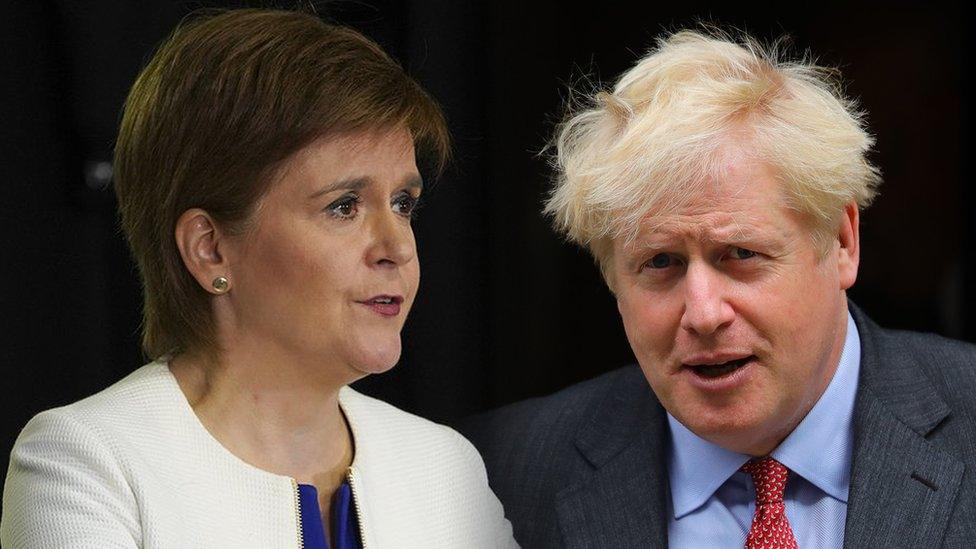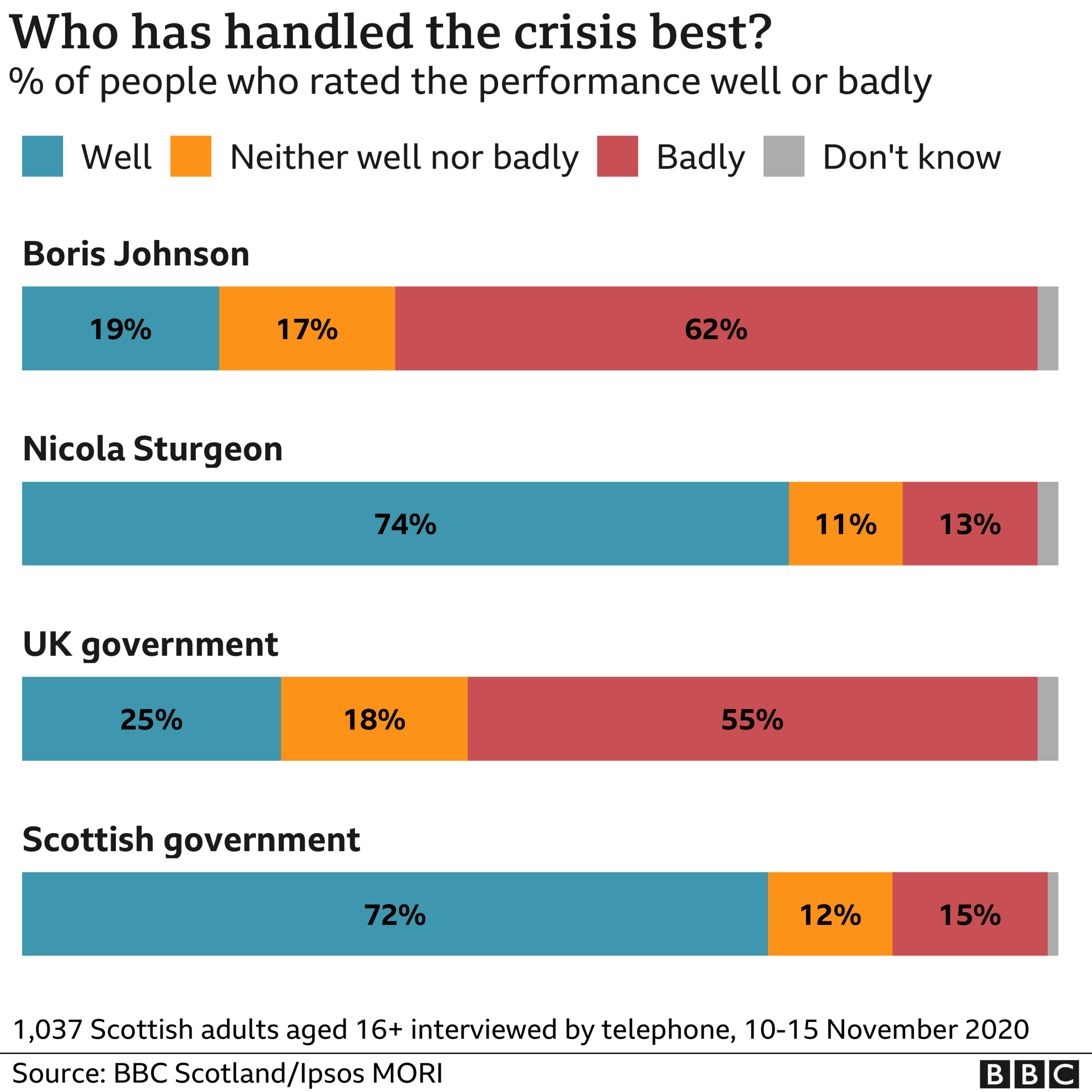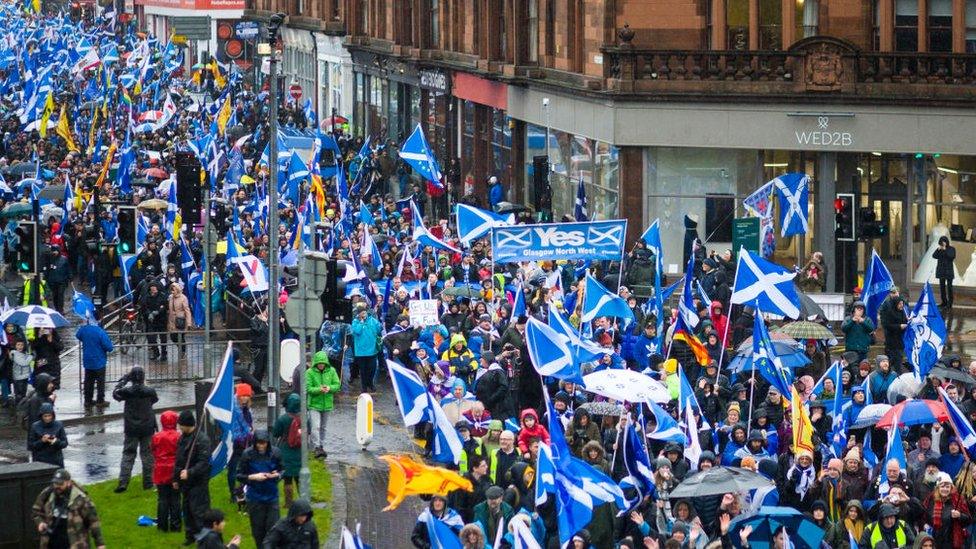Covid in Scotland: How do Scots rate their leaders in the pandemic?
- Published

The poll suggests significantly more people believe Nicola Sturgeon has handled the pandemic well than Boris Johnson has
Voters in Scotland are not wholly uncritical of how the Scottish government has handled the coronavirus pandemic. However, many still feel it is performing better than the UK government - with potential implications for the debate about independence.
These are some of the key findings of a poll conducted last week by Ipsos Mori for BBC Scotland - just before the announcement by Nicola Sturgeon of a new lockdown for those living in many areas of western and central Scotland.
After a summer in which it appeared that Scotland might be close to eliminating the virus, the autumn has witnessed a second wave and the introduction of tougher restrictions.
This about turn might have been thought to have damaged public confidence in how Edinburgh has been handling the pandemic.
Indeed, nearly half (49%) believe the Scottish government was "too late" in tightening the coronavirus restrictions, while 42% feel the timing was about right and just 5% that it was too early.
Yet - prior to this week's announcement at least - the Scottish government is largely thought eventually to have made the right call.
As many as 62% think the restrictions under which they have until now been living locally are "about right", while those who think that they are "too strict" (19%) is almost equally counterbalanced by those who feel they are not strict enough (17%).
The poll suggests there has so far only been a minor dent in the Scottish government's reputation for handling the pandemic.

As many as 72% now say that the Scottish government has handled coronavirus well, while just 15% think it has done so badly. When Ipsos Mori conducted a similar poll in May, 78% said it was doing well and 11% badly.
Much the same is true of how Nicola Sturgeon is thought to have handled the pandemic. Now 74% say that she has done so well, and 13% badly. In May, 82% felt she was dealing with it well and just 8% badly.
In so far as they exist, critics of Edinburgh's handling of the pandemic are most common among the minority who think that the measures in their area have been too strict.
Only about half (49%) of this group feel the Scottish government has handled things well, while one in three (33%) believe it has done so badly.
This suggests Tuesday's announcement is only likely to dent the Scottish government's reputation further if voters believe the lockdown in the west of Scotland is too harsh.
Whatever the difficulties that have beset the Scottish government in handling the pandemic, they have been matched by those faced by the UK government, which has had to introduce a tough lockdown throughout England and reverse its attempt to reduce the financial support given to those who have been furloughed.
This appears to have had an impact. Just 25% of people in Scotland now say that the UK government has handled the pandemic well, while 55% believe that it has done so badly.
Compared with last May, there has been a nine point drop in the proportion who say the UK government is doing well and a four-point increase in those who believe it is performing badly.
Meanwhile, the prime minister's personal ratings are even worse. Just 19% (down 11 points on May) believe he has handled the pandemic well, while 62% (up seven points) feel he has done so badly.

The poll suggests a significant number of people who previously voted No to Scottish independence think the Scottish government is handling the pandemic well
What may particularly worry the UK government is that even among those who voted No in the 2014 independence referendum, the Scottish government and Nicola Sturgeon are rated more highly than the UK government and Boris Johnson.
No less than 64% of No voters believe the Scottish government has handled the pandemic well, while 65% say the same of Nicola Sturgeon.
In contrast, just 31% believe the UK government has addressed the pandemic well, and only 26% say the same of Boris Johnson.
This divergence poses the risk for the UK government that some of those who in 2014 voted to stay in the UK might now have drawn the conclusion that Scotland would be governed better under independence.
Today's poll finds that among voters as a whole, as many as 39% believe an independent Scotland would have handled the pandemic better, while just 19% feel it would have fared worse.
Those who voted No in 2014 are, of course, less likely than those who voted Yes to say that an independent Scotland would have handled the pandemic better.
However, as many as 15% do believe it would have done - whereas only 6% of Yes voters feel that coronavirus would have been handled worse.
Only 37% of No voters believe an independent Scotland would dealt less effectively with the issue.
It seems that, so far at least, some of those who voted No six years ago do not feel that the coronavirus pandemic has been the Union's finest hour.

